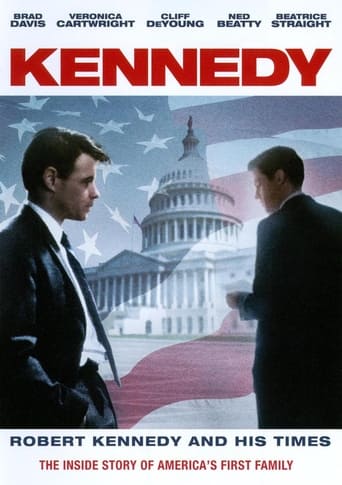sychonic
One's view of the movie itself will likely depend on what one's view of RFK is, and in general, of the sixties and the prevailing insanity of that time. Since most folks already know of his fate, I'll give one easy example of this particular effort--at the end of it, when he's been assassinated, the makers of course launch into a rendition of "Where Have All The Flowers Gone?", an inane anthem of folk foolishness from the sixties.Since I'm not a huge RFK fan, it's not surprising I find his pontificating self-aggrandizement a touch loathsome, which he tried to mask as compassion, it was perhaps his worst feature, this is hardly an unbiased dislike. Generally speaking, I don't mind bio movies that gloss over the ugly features of a person's life, we all have flaws and any movie can turn a sinner into a saint or the reverse by just concentrating on certain aspects of one's life. The movie isn't bad just because it doesn't relate RFK's rather stunning lack of principle, something it makes light of by portraying his "ruthlessness", something he was well known for, as merely a political attack vehicle of his opponents. An interesting omission is that RFK actually worked as a counsel for Joe McCarthy during the Red Scare days. Not something many RFK fans like to remember, or even know about. Perhaps the thing that annoys most is that biopics for the last twenty or thirty years depend largely on whether the politician adhered to the prevalent extreme left wing views of Hollywood folks who make these movies.Other than that, this RFK outing at least tends to avoid some of the strangely inappropriate intimate conversations writers often imagine between their subject and intimates, in particular wife and family. It is absolutely littered with sixties clips of nauseating anti-war demonstrators, foolish political posturing, and hippies galore. RFK's enemies are of course evil beyond belief, LBJ ends up being hideously Machiavellian (he was such, but a strange dose of reality in an otherwise gauzy biopic), and of course J. Edgar Hoover is the cryptofascist that is his common depiction.As far as these things go, as the 70s and 80s were filled with them on MLK, JFK, Ike, FDR, etc., this wasn't bad, but it has all the common flaws. I'd skip it, unless one is really interested in a truly silly exercise in RFK worship.
tompaine-4
Does this miniseries only paint Robert F. Kennedy as a hero? Yes. But perhaps that is because they had a good source subject. RFK, unlike many politicians, grew throughout his career. If you are interested in getting an overview of his life, this miniseries hits many of the important milestones in his life.Start there. Then read "To Seek a Newer World". You might just encounter one of the most remarkable "what ifs" of the later 20th century (or as the tagline of the series goes, "Of what might have been").
tgibbs279
I'm a Democrat, but I have mixed opinions about Robert Kennedy. He had many good qualities (like his opposition to the Vietnam War, and his support for civil rights) but he had some less-than-impressive traits, too (such as the long delay in his conversion to the civil rights movement). And I think this movie glossed over the bad, over-emphasized the good, and left us with an inaccurate picture of RFK as some kind of saint. No one is as perfect as Robert Kennedy appears in this miniseries. In this movie, Kennedy's opponents are always wrong, while Kennedy's always right. Real life isn't like that. I know that in any movie based on real events, you have to condense things and cut a few corners here and there. But this movie condenses too much, and treats complex people and issues as if they were black and white. I'll give the movie credit for one thing: any movie that gets people interested in history has some merit. If you watched "Robert Kennedy & His Times" and it inspired you to pick up a good history book, it was worthwhile. At least in the book, you'll get the full story.


